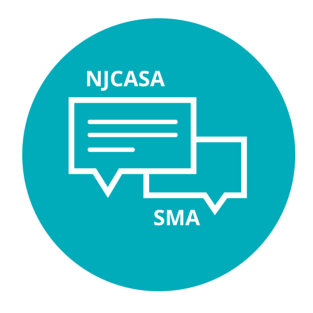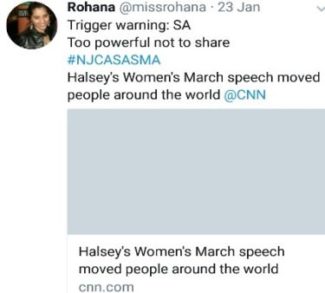April marks a very important month – Sexual Assault Awareness Month. As an NJCASA Social Media Ambassador (SMA), I take pride in the responsibility given to me through this position. My role as an SMA allows me to remind people who have experienced sexual violence that they are not alone, that they are believed, and that they are not silenced. Through my role as an SMA, I get to inform the conversations about sexual violence by informing my followers and advocating for awareness. It has been one of the most liberating and empowering experiences of my life.

Justice for victims begins with awareness and knowledge, which is one part of why SAAM is so important. It allows people to connect and understand the urgency of preventing rape culture and violence — something that SMAs contribute to year-round.
We all can contribute to a safer, more-just society. The conversations we have about survivors, sexual violence, and oppression matter. When we talk about sexual violence, it’s important to remember:
1. Survivors do not all look and / or act the same.
Movies, TV shows, and other forms of media can often portray victims in a certain light that is not representative of all survivors. Allowing this to influence our perspective of who a survivor is and/or how a survivor acts can make it more difficult for survivors to come forward if they feel they don’t fit this ‘perfect mold.’

As an NJCASA SMA, one of the ways I spread this idea and expand knowledge has been through sharing articles and stories of people who have shared their experience(s) with sexual violence. My intent is to make the issue more relatable and real to those who read the articles and let people who have experienced violence know they’re not alone.
2. Acceptance is important.
This is one of the most important ways that we can help support our friends, family, colleagues, and loved ones who may have gone through sexual violence.
“I believe you,” can be empowering for a survivor to hear, especially when they open up about something that may make them feel vulnerable. This is something I have started to integrate into social media posts in the form of inspirational quotes or simply sharing an image with those words and a caption explaining why I chose to share the image.

3. Pay attention to the words you use and spread knowledge.
The words we use can impact those around us. We can make sure to avoid language that reinforces survivor stereotypes and rape myths. We can call in those who may unintentionally say something harmful and provide people with the correct information. The best way to be an impactful voice is to be proactive and healthy in the voice you choose. Always aim to keep yourself informed, share information, and try to understand and empathize with those affected by sexual violence.

As an SMA, I like to share any articles that have information to help educate people on the perspective and experience(s) a survivor might go through, including information and resources that might be useful. You never know who you may help by spreading information that is factual and important.
4. Be the change.
As an SMA, I take pride in having a very important duty to share the wealth and information I learn about sexual assault and violence. Education is the first step in eliminating ignorance, so I share articles, videos, and texts from books. I share anything that makes me go, “Hmm, I did not know that,” because chances are, other people didn’t know either.
Never stop learning, never stop asking, and never stop sharing the wealth of knowledge you gain. This has been one of my biggest guidelines whenever posting as an SMA and I encourage everyone to do the same. During Sexual Assault Awareness Month, we can ignite our curiosity and passion, and embrace our voice!
Rohana Sengupta is Social Media Ambassador for NJCASA. She’s also a Business Strategist by day and a World Changer by night. She graduated with her master’s in Business Administration from Fairleigh Dickinson University and a duo-Bachelor’s degree in Business and Communications from Monmouth University. She is the author of the Book Adultish rage, Love, and Peace, founder of the nonprofit organization Sudhara Organization – a nonprofit that advocates for education equality and women’s right internationally, and a steering committee Member of UNICEF NEXT Gen.
Sharing is caring! Review our sharing policy.
